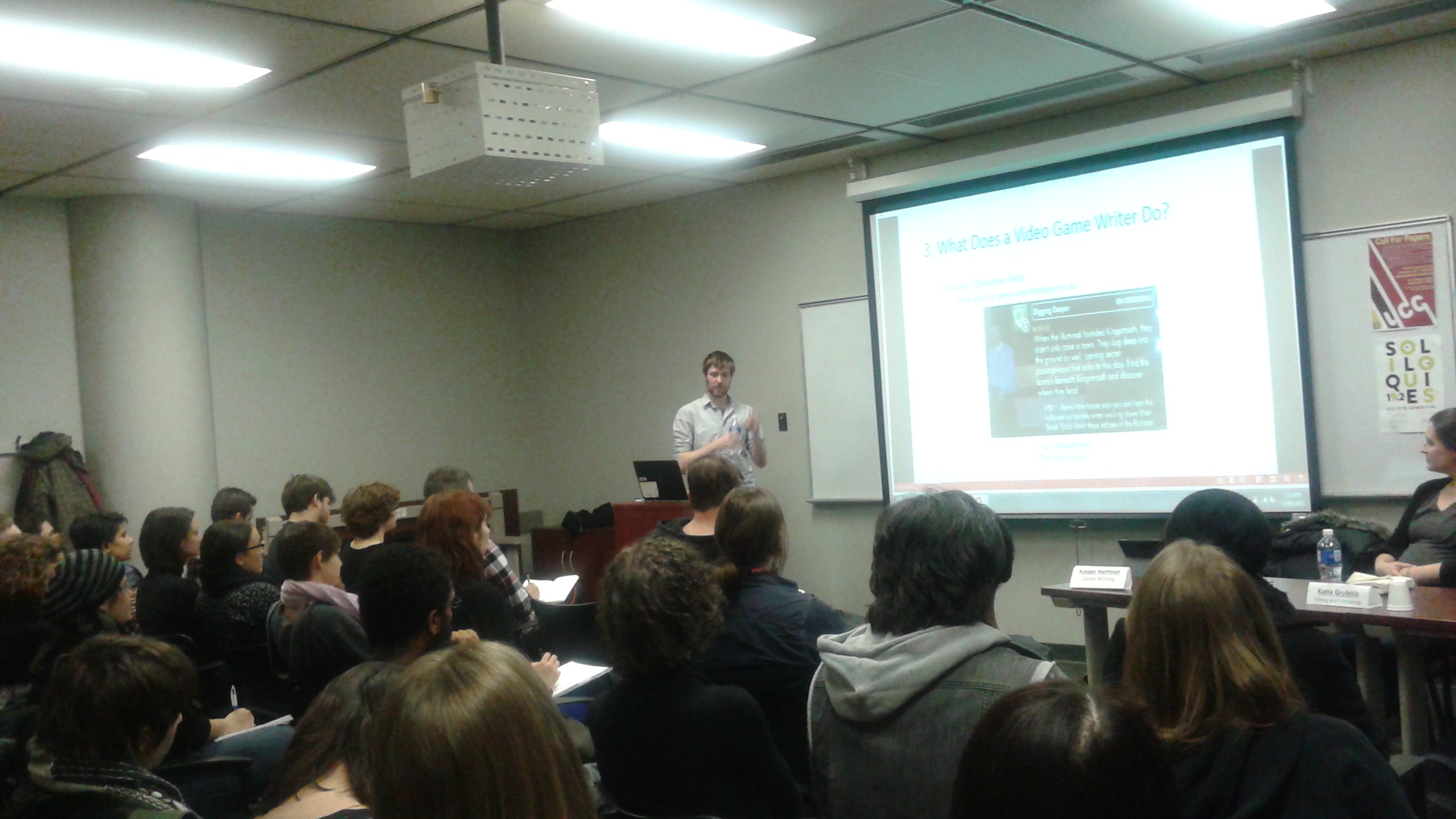Panel shares experiences and tips on how to land that job upon graduation
Of the major degrees, English is the perennial butt of jokes for finding post-school success. We’ve all heard of English graduates, optimistic rather than practical, joining the swelling ranks of arts majors looking down the gullet of an unsure future and competitive academia the moment they descent the podium steps.
The possibilities aren’t that bleak if the search is widened and non-traditional careers are considered. “What To Do With Your English Degree”, an event sponsored by the Concordia Association of Students in English (CASE) and featuring four great panelists speaking from experience on their professional journeys through non-traditional careers.
Enter Kasper Hartman (Video game writing), Katia Grubisic (Freelance editing and translation), Chris Masson (TV Writing) and Jack Allen (Digital Marketing), the quadrumvirate putting everybody’s minds to ease.
The game path
Kasper Hartman graduated from Concordia back in 2008 and has always dabbled in creative writing and games before joining the two. He says gamers’ expectations have kept pace with improvements in technology—that is to say exponentially. A decade ago, games were first created and the finished product sent to the writers for words and actions. Now, the strategy is reversed, with storytelling skills and narrative development seen as an important resource foolish to skimp on. Developers have realized (as the Star Wars prequels have not) that technology and graphics can create a world, but made for a thin veneer when it comes to breathing it to life and offering the player a sense of meaning and motivation. Creatives are increasingly taking control and dictating the terms.
“As many years ago a writer may have been the very last person hired for a project, today they might be among the very first,” he said, adding,“There’s a lot that goes into the job that’s not just purely writing, and the more versatile you can be, the better you’ll adapt to the ups and downs.”
“Talent and craft and a little bit of courage”
The best advice editor and translator Katia Grubisic has is not to worry.
“The skills you have and that you didn’t know you had will prove themselves in the coming months and years,” she said.
Grubisic is a freelancer, that perilous and scary existence entirely dependant on you selling yourself without a middleman or corporate security, but with the advantages of being able to schedule and run it at your own pace.
She divides careers into three parts: the incredibly lucrative, the professionally unavoidable, and the enjoyable.
“It’s really strange what you wind up enjoying,” she said. “The smallest thing can steer you down a path,” she said, embodying the millennial experience of lesser job security and greater mobility. If you’re freelancing, the enjoyable may not pay as much as the status quo, but don’t close yourself to it. On the other hand the lucrative niche might be the one you devote more of your time to, but won’t necessarily be the most interesting one. “The more you do the work, the more people will be willing to believe you could do more work.” And that, she says, means being able to charge more.
Then there are the unavoidable, potentially painful and exhausting stepping stones. These are the opportunities, internships, and volunteerism that might not fit perfectly with your idealized career, but one that instinct tells you won’t come again. Seize them, do your best, and see what happens.
Grubisic’s bonus tip for polyglot translators: There’s a rush happening to standardize texts and contracts as countries become better integrated and join larger political and economic unions. For example, with each European country entering the EU, there’s a very real demand for translators to step in ease the transition. This means fluent third- or fourth- language speakers stand to gain.
Practicing the art of ‘showing up’
Chris Masson’s background was in creative writing and theatre and he’s always believed it’s about putting the work before the ego. Many jobs are collaborative. “If at any point you’re pushing back or resisting change or feedback or criticism, that’s going to reflect badly on you,” he said. Making yourself a pleasure to work with will greatly improve chances of an encore, as reciprocity is a universal rule.
This means networking, networking, networking. Spend time around like minded people, share ideas and absorb tips.
Grubisic points out, though, that explicitly wishing to network can come off as inauthentic. Don’t be a business card distributing machine: people will see through you. Rather, take a genuine interest in people. You’re interesting if you’re interested.
Grades and French are important…up to a point
Jack Allen is currently an online marketer and an anglophone, he says a lack of French won’t hold back a skilled and ambitious individual from breaking out in Montreal. Grades matter if you’re aiming for postgraduate studies and beyond, but skillsets are learned outside the classrooms and it’s more a matter of leveraging your effort and personality towards a desired goal.
“For most job applications, you wouldn’t put your GPA,” he said.
All four share broadly similar paths: an eagerness to take on work, no shyness for approaching people and offering their services, and versatility. The particulars are centered around English students but the advice is universal: market yourself, try for that rung just above your immediate reach, and remember that skills can be learned on the job and you’re more likely to be hired based on your perceived enthusiasm and attitude.
Engage and you’ll find success.
